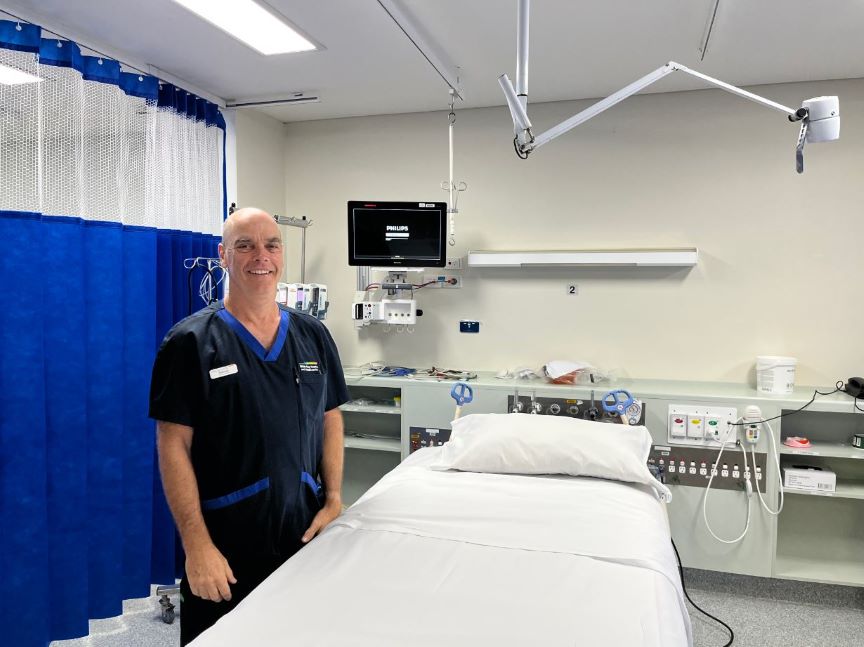
When he first arrived in Australia, former South African paramedic Etienne Van Niekerk spent time as a stay-at-home dad before embarking on a new journey when he started a nursing degree.
It was during his study that Etienne (better known by colleagues as ET) first joined the Hervey Bay Hospital team as an assistant in nursing (AIN,) where he gained valuable experience in a hospital environment and firsthand knowledge of the team he now works alongside as a nurse.
“I spent 23 years as a paramedic in South Africa, and my wife was an anaesthetist in South Africa. We decided to move to Australia,” ET said.
“When we got here, we were unsure about how childcare was going to work. So, for the first two years in Australia, I was essentially a daddy day care, looking after my youngest son.”
With his wife working at Hervey Bay Hospital already and ET’s background as a paramedic, many of their friends mentioned that he should consider a ‘lateral move’ into nursing.
“I've always wanted to have a degree and I decided to study - what a challenge that was,” he said.
“I was scared. I was 50 years old and my last formal education was in 1997, which was a long time ago!
“As soon as you finish your first placement at uni, you're eligible to apply to work as an assistant in nursing (AIN), which is what I did. I went for the interview and I was successful.”
His time as an AIN not only gave ET firsthand experience working as part of the Hervey Bay Hospital team, but it helped him gain knowledge that he now uses as a nurse in the intensive care unit (ICU).
“University education focuses on different things. It’s the little things such as patient interaction, patient rolling, patient handling and dealing with stress – that is not something that they teach at university; that is something that you get exposed to working as an AIN,” ET said.
“It’s not that you are looking after the patient's life per se, but it’s all the other things that you've gained from patient interaction, to seeing how the registered nurses go through the system of evaluating and examining a patient and how the doctors interact with them.”
“It made everything easier in university and it made a lot more sense when I reached the registered nurse stage myself. I draw on a lot of knowledge that I gained as an AIN, not just my paramedic background. I would recommend it to anyone.”
The flexibility to work around assignments and university schedules was a bonus of joining the team as an AIN, as well as working across different areas in the hospital and having experienced nurses to talk to who could pass on their knowledge and skills.
“That's the nice thing, as you get that opportunity to work in different wards and see if maybe medical is the way you want to go or if you’re really interested in the post operative side of it,” ET said.
After completing his first two years of study, ET went on to apply for an undergraduate student in nursing (USIN) position that provided him with a further scope of practice as he continued to gain skills that he now uses as a registered nurse.
Following graduation, ET was appointed last November as a registered nurse where he worked in a post graduate position in the surgical ward before shifting to a position in ICU while he is completing a transition program – which is a role he thoroughly enjoys.
He says he has found great joy working as a nurse in ICU.
“I like the critical thinking side of it. I feel that I've got a little bit more autonomy in ICU than you have in the general ward,” he said.
“In ICU, if the patient’s blood pressure is dropping, I immediately turn up his inotropes. It's a nurse-led decision because the orders are there already and you need to keep the blood pressure within a certain range. That little bit of autonomy is what I love.”
“What greater privilege is there than helping someone who's in critical need of your expertise?” he said.
“I've done that as a paramedic for 23 years of my life - there's nothing more rewarding than when someone is in a really bad situation and you can make a difference. Yes, you can save a life.
“As a nurse you're saving lives every single day; every single patient that you touch, you can potentially change the outcome. It’s hard work and you're on your feet the whole time - but there's nothing more rewarding.”